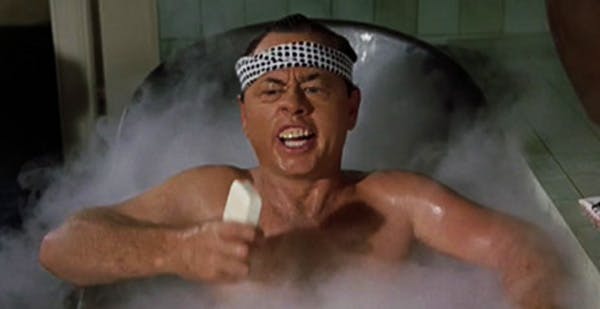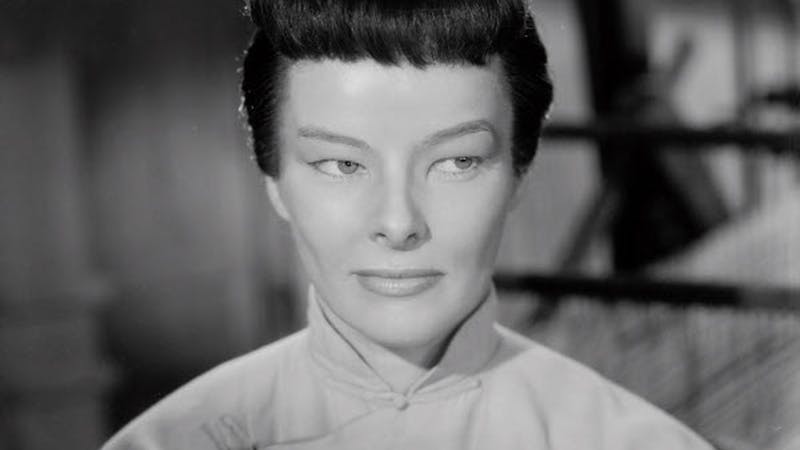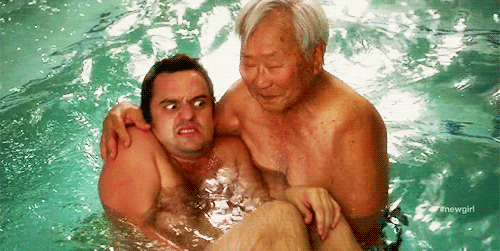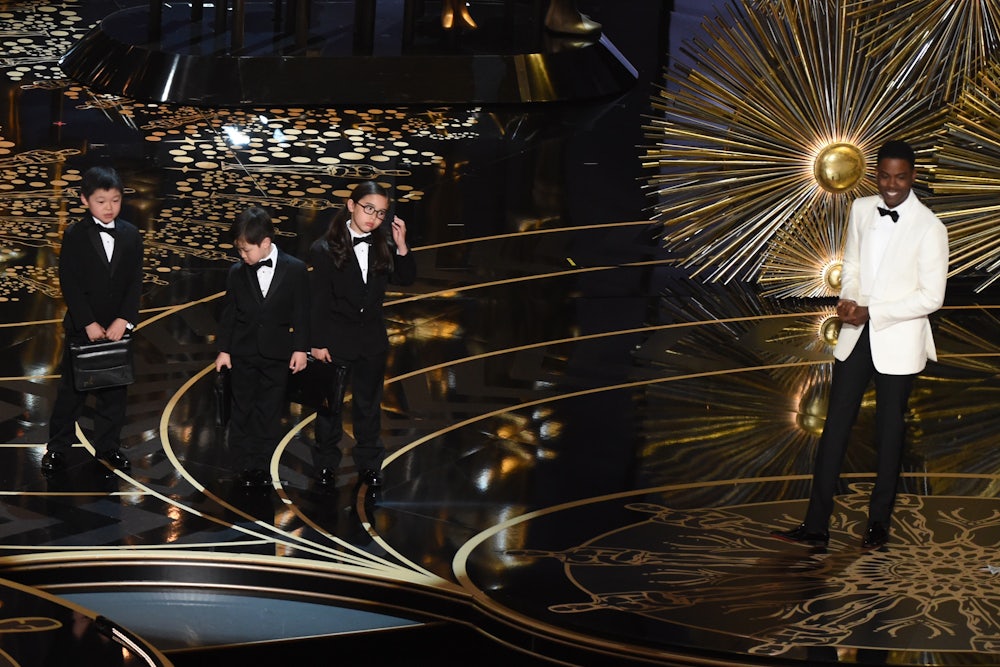At the Oscars last month, in a performance for which he’d be praised for skewering Hollywood’s lack of diversity, host Chris Rock took a moment to introduce PricewaterhouseCoopers, the accounting firm that tallies the votes. “They sent us their most dedicated, accurate, and hard-working representatives,” he said. “I want you to please welcome Ming Zhu, Bao Ling, and David Moskowitz.” Three Asian kids in tuxedos walked onto the stage, briefcases in hand. “If anybody is upset about this joke,” Rock added, “just tweet about it on your phone, which was also made by these kids.”
In one brief skit, Rock managed to perpetuate three common, distinct stereotypes about Asians or Asian Americans: the model minority student, who is born a math genius; the foreign child laborer, who assembles tech gadgets for pennies and kills American jobs; and the silent, obedient immigrant, onto whom we can project whatever identity we please.
“I’m a fan of Chris Rock
because he’s a guy who tells it like it is, and I was really looking forward to
hearing what he was going to say in his monologue. But I was just so
disappointed,” said Guy Aoki, founding president of the Media Action Network
for Asian Americans. “I called it child abuse. He abused those three cute Asian
kids, which just pissed everybody off.”
Rock’s jokes, and the
laughter from the Academy Awards crowd, showed that even in this age of supposedly excessive political correctness and internet outrage, many
still think it’s socially acceptable to make fun of Asians. Of course, many others
don’t: Rock’s jokes caused considerable anger from the Asian-American community. On
Tuesday, 25 Academy members, including Sandra Oh, George Takei, and Ang Lee, sent a letter to the Academy condemning the “tasteless and offensive skits” and
calling on the organization to “preclude such unconscious or outright bias and
racism toward any group in future Oscars telecasts.” The Academy responded
by promising to “be more culturally sensitive”
in the future.
The PWC skit was easy to condemn because it was so obvious. But much of the racist humor about Asians these days is subtler—sometimes, the joke is simply that the actor is Asian. Which is progress, of a sort: The common joke used to be that the actor was not Asian, but a white person performing an Asian stereotype. Asian humor today is more insidious and thus tougher to combat, though there is at least one obvious solution.
Hollywood’s early years,
about a century ago, coincided with a wave of anti-Asian fervor in America,
especially in California. Asian immigration, already restricted by the Chinese
Exclusion Act of 1882, was almost entirely halted by subsequent laws in 1917
and 1924. In 1929, just as studios like MGM and Warner Brothers were setting up
shop, Paramount released the first of many Fu Manchu movies. Described in British author Sax Rohmer’s novels
as “the yellow peril incarnate in one man,” Fu Manchu, with his evil mustache and
plans for world domination, became the first widely recognized Asian archetype in American pop culture.


In the first half of the century, the few Asians who did work in Hollywood were consigned to villainous roles or bit parts while their white counterparts played Asian characters in yellowface. Based primarily on stereotypes about East Asians, yellowface consisted of giving actors’ skin a yellow hue, arching their eyebrows, tugging the corners of their eyes, and sometimes giving them buckteeth. Mickey Rooney’s 1961 performance as a Japanese photographer in Breakfast at Tiffany’s is shocking today, but it was industry standard for decades—if not always as outrageous. In 1935, MGM cast German-born Luise Rainer over Chinese-American Anna May Wong in its adaptation of Pearl S. Buck’s The Good Earth, the story of a Chinese peasant family before World War I. Rainer went on to win the Best Actress Oscar for her performance as the lead (and several years later, in another Buck adaptation, MGM cast Katherine Hepburn as a Chinese woman in Dragon Seed). To this day, more white actresses have won Oscars for playing Asian characters than Asian actresses have won at all.
Yellowface eventually began to fall out of favor in the ’90s, but industry racism persisted. In 1995, the producers of the first-ever Asian-American sitcom, All American Girl, demanded Korean-American star Margaret Cho act “more Asian”—and brought in an “expert” to teach her. Just last year, director Cameron Crowe apologized for casting Emma Stone as a half-Asian character in Aloha. The reaction that movie provoked shows it’s no longer considered acceptable for white actors to play Asian roles, but that hasn’t solved the myriad problems with the Asian roles themselves.

In a 2012 episode of New Girl, a half-hour sitcom on Fox,
Nick meets a mysterious old Asian man (played by Korean-American Ralph Ahn) on
a park bench. The Asian man never speaks; his role is to listen to Nick’s monologues
and nod knowingly, like some mysterious Zen master. “I can’t keep thinking of
you as my magical best friend with no name,” Nick says at one point. “Joe?
Tommy? Louis? Tran? Is it Tran?” The joke culminates with Tran bathing Nick
like a baby in a swimming pool; Nick is bewildered, but ultimately accepting of
Tran’s exotic ways. Tran continues to appear on the show—Nick even dates his
granddaughter—but we never learn if Tran’s name really even is Tran. The
Asian’s man identity is entirely decided by the white protagonist.
Tran’s silence is characteristic of Asian characters in pop culture. They’re rarely given any lines: Only five percent of speaking roles in 2014’s 100 top-grossing movies went to Asian actors, compared to 12.5 percent for black actors and 73 percent for white actors, according to an annual study by the USC Annenberg School of Communication and Journalism. When an actor doesn’t speak, his appearance—and thereby his race—becomes his defining characteristic. Asian actors are simply cast for the way they look, so that the audience can project any number of stereotypes onto them, be it the wise Buddha or the clueless foreigner.
The speaking parts are
hardly better. Pitch Perfect 2 employs
the classic ninja trope in a scene where Lilly (Hana
Mae Lee), a pigtailed Asian girl who cannot speak above a whisper, saves Beca
(Anna Kendrick) from a booby trap. “I sleep upside down like a bat,” she says
while hanging from a tree branch by her legs, a throwing dagger in each hand. The Unbreakable Kimmy Schmidt, a Netflix
sitcom, features an Asian character named Dong who speaks with a heavy accent, is
good at math, and delivers Chinese food by bike (his name is a punchline, too,
but more nuanced than it might seem). In Tina Fey and Amy Poehler’s film Sisters, actress Greta Lee plays a
Korean nail technician who also speaks with an accent. When asked if the role
came with a thick accent, Lee told The New York
Times, “There
was no mention of the accent, but that was the expectation.”
As stereotypes go, it could be worse. Asians Americans aren’t assumed to be dangerous, uneducated, or lazy. What’s so bad about being considered smart, law-abiding, hard-working, wise, and possibly skilled in the martial arts? While these stereotypes might not cause the same degree of prejudice, discrimination, and outright physical danger that other minority groups face, the very gentility of the prejudice makes it harder for people to take it seriously.
“There isn’t an easy way of rebutting model minority stereotypes,” said writer Jeff Yang, whose son Hudson stars in ABC’s Asian-American sitcom Fresh Off the Boat. “Even when you actually puncture them, people dismiss the response because they see it as such a minor slight, something they would certainly laugh off. So why can’t you? The very act of getting upset about it ends up being a source of laughter for them.”
Asian Americans rarely inject themselves in the national conversation about race and identity politics, partly because many Asian cultures emphasize humility and because of an immigrant desire to fit in and avoid trouble. That’s changing as the number of second and third generation Asian-Americans increases, but it has long fed another stereotype: that they’re obedient, and thereby easier to make fun of. “It’s easier to target Asians because it seems safer,” said Karin Wang of nonprofit advocacy group Asian Americans Advancing Justice. “It’s a community that’s viewed as less likely to rise up en masse and speak out.”
Thus, there’s less awareness of what is offensive to Asian Americans. Rock’s jokes at the Oscars were so distasteful because the three kids were some of the only Asian faces at the show. No Asian actors were nominated, though the Academy did trot out celebrities like Mindy Kaling and South Korean actor Lee Byung-hun as presenters. “The absence of Asian Americans made the subjecting of Asians to that particular joke that much more overtly a sign of dismissiveness and disregard,” said Yang. While Rock designed the rest of his show to tease out the racial tensions between blacks and whites, he clearly didn’t think about how Asians fit into that delicate balance.
“There’s not an awareness in the culture that we have to try to be sensitive of what might be offensive to Asian people. The Oscars were a great example,” said Vice culture editor James Yeh. “Chris Rock is especially aware of the things that are not cool to do with black people anymore. [But] if Aziz Ansari were the host, he wouldn’t want to do some joke about Indian people because he’d be aware that these are people, not just vague themes or topics that we can use as a reference. That’s what diversity helps us do. It brings in more perspectives.”
The only way to increase awareness is to have more people of diverse backgrounds working in Hollywood. But according to Nancy Yuen, a sociology professor at Biola University whose upcoming book chronicles racism in Hollywood, Asian American actors are still struggling to break stereotypes. “Asian American actors have told me they are just seen for their race,” she said. “There’s less specificity in the casting calls, just for ‘Asian man.’ Usually casting calls specify if they want character actors or leading men, but with Asian actors they see both types across ages, from 20 to 50. And if you’re looking for a villain, any Asian will do.”
Many casting directors’
idea of what makes a good Asian actor derives from Hollywood’s previous
depictions of Asians, creating a vicious circle in which Hollywood perpetuates a
homogenous Asian identity. Chinese-American actor Garrett Wang, who played Harry
Kim on Star Trek: Voyager, once
auditioned for the role of a Japanese mafioso by imitating the accent of famous
Japanese actor Toshiro Mifune. “‘Stop! Stop!’ the casting director goes,” he
remembers. “‘I don’t know what you’re doing right there, but that’s not the
accent I’m looking for.’” Out of frustration, Wang switched to a stereotypical Cantonese
accent popularized by the Charlie Chan movies. “‘That’s what I’ve been looking
for!’ she said. ‘I’m glad you were able to figure it out.’” He confronted the
casting director about the accents and walked out of the audition (he didn’t get
the part).
In the past year, television has provided a glimpse of what more diverse representation can look like. Twenty years after All American Girl was canceled after just one season, Fresh Off the Boat tackles the Asian-American experience head on, filtering stereotypes like the tiger mom and child math geniuses through an Asian perspective. In its funniest moments, the show captures how strange white people seem to Asians at times, like when Jessica (Constance Wu) joins a group of rollerblading Stepford wives in order to fit in. On the other end of the spectrum, Dr. Ken, starring Ken Jeong, feels more like any other American family sitcom—the family just happens to be Asian. These shows give Asian-American actors, writers, and producers the power to choose whether to tell specifically Asian stories or stories that have little to do with race.
It’s hard to say how much pop culture drives society rather than simply reflecting it, but television and other media serve an important role in changing public opinion. Shows like Modern Family and Will & Grace made gay couples normal for the American public long before the Supreme Court declared marriage equality the law of the land. With shows like Fresh Off the Boat, “we’re seeing the normalizing of Asians in America so they could be the family next door,” said Wang. “That would have been huge for me, growing up in a very white town in the Midwest. People would make fun of me, but I wouldn’t know how to challenge that. TV helps people embrace an understanding of a more diverse country around them.”
